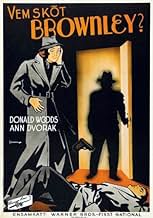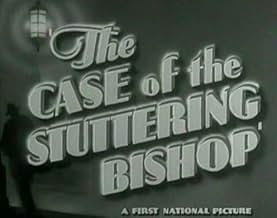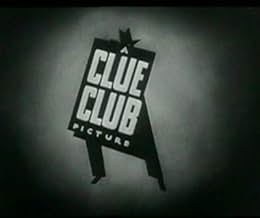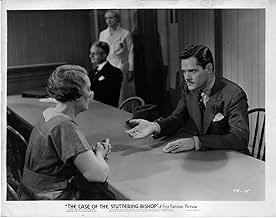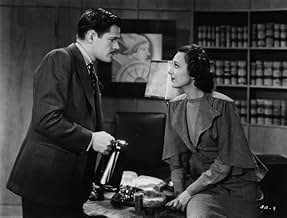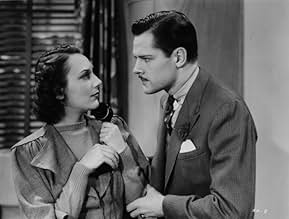An improbable stuttering bishop from Australia asks for Perry Mason's help in proving the identity of the legitimate heir to a millionaire.An improbable stuttering bishop from Australia asks for Perry Mason's help in proving the identity of the legitimate heir to a millionaire.An improbable stuttering bishop from Australia asks for Perry Mason's help in proving the identity of the legitimate heir to a millionaire.
- Director
- Writers
- Stars
Helen MacKellar
- Stella Kenwood
- (as Helen McKellar)
Charles C. Wilson
- Hamilton Burger
- (as Charles Wilson)
Eddy Chandler
- Detective James Fleet
- (uncredited)
- Director
- Writers
- All cast & crew
- Production, box office & more at IMDbPro
Featured reviews
Case of the Stuttering Bishop, The (1937)
** 1/2 (out of 4)
Sixth and final film in Warner's Perry Mason series features a new guy in the lead role but the film turns out to be a rather entertaining entry. This time out, Perry Mason (Donald Woods) is visited by a bishop who asks him to investigate a manslaughter that happened twenty-two years earlier but the guilty party is still free. Perry starts to investigate, which leads him to a billionaire who eventually winds up dead and it seems the same person is behind the two cases. This is a pretty strong film that manages to be quite entertaining, although it would have benefited by a stronger supporting cast. Woods is actually very good in the role of Mason and brings his own charm and brains to the role. Ann Dvorak is entertaining as his secretary but the rest of the cast is so-so at best. The case is actually very well written and manages to be quite complicated, which ruins the ending when we get the typical easy way out and that's the guilty person getting away with it until they break down and admit everything.
** 1/2 (out of 4)
Sixth and final film in Warner's Perry Mason series features a new guy in the lead role but the film turns out to be a rather entertaining entry. This time out, Perry Mason (Donald Woods) is visited by a bishop who asks him to investigate a manslaughter that happened twenty-two years earlier but the guilty party is still free. Perry starts to investigate, which leads him to a billionaire who eventually winds up dead and it seems the same person is behind the two cases. This is a pretty strong film that manages to be quite entertaining, although it would have benefited by a stronger supporting cast. Woods is actually very good in the role of Mason and brings his own charm and brains to the role. Ann Dvorak is entertaining as his secretary but the rest of the cast is so-so at best. The case is actually very well written and manages to be quite complicated, which ruins the ending when we get the typical easy way out and that's the guilty person getting away with it until they break down and admit everything.
Donald Woods and Ann Dvorak were fine as Perry Mason and his secretary, Della Street, but it took me a while to get used to not seeing Raymond Burr in the Mason role. The complicated plot involves two women named Janice who claim to be the heir to the fortune of Douglas Wood, and an Australian bishop who asks Mason to see Mira McKinney, who can prove which one is the real one. But Wood is killed going to the rendezvous with McKinney, who is charged with murder. In customary Perry Mason style, there is a final courtroom scene (in this case only a hearing) where Mason flushes out the killer and the phony Janice. I enjoyed trying to follow the plot and the comedy that was prevalent. Tom Kennedy suddenly remembers an important item when he hears the name "Sampson," because it involves a ship called "Delilah." Woods always asking Dvorak to remind him to give her a raise when she gets a good idea (a running gag). Even the bishop, who explains he stutters only when under some emotional stress, provides some comedy at the end. He sheepishly stammers "g-g-goodness g-g-gracious" when three of the principal women kiss him goodbye.
Donald Woods takes over the role of Perry Mason in the last of the Mason series that Warner Brothers did in the 30s with Ann Dvorak as Della Street in
The Case Of The Stuttering Bishop. Erle Stanley Gardner's lawyer/sleuth
would have to wait for television and Raymond Burr for its next incarnation.
Edward McWade, a bishop who stutters comes from Australia to see Woods about a possible fraud being perpetrated on millionaire Gordon Oliver regarding a fake granddaughter being foisted upon him. Later on Myra McKinney, Oliver's estranged daughter-in-law is arrested and it's Perry Mason for the defense.
Hamilton Burger played by Charles Wilson and Joseph Crehan as Paul Drake also appear. Burger for his one and only time in the movie series and Drake is a more traditional private eye. Previously Drake was "Spudsy Drake" played for comic relief by Allen Jenkins in previous films.
Viewers of the classic TV series will note that this observes the Perry Mason paradigm about never having guilty clients and the killer being unmasked in court. Previous films strayed from that somewhat.
I have to mention Tom Kennedy who took a leave from the Torchy Blaine series and brought his usual thick as a brick detective character with him. He's a favorite so incredibly droll and so naive.
Watch it for Tom Kennedy alone.
Edward McWade, a bishop who stutters comes from Australia to see Woods about a possible fraud being perpetrated on millionaire Gordon Oliver regarding a fake granddaughter being foisted upon him. Later on Myra McKinney, Oliver's estranged daughter-in-law is arrested and it's Perry Mason for the defense.
Hamilton Burger played by Charles Wilson and Joseph Crehan as Paul Drake also appear. Burger for his one and only time in the movie series and Drake is a more traditional private eye. Previously Drake was "Spudsy Drake" played for comic relief by Allen Jenkins in previous films.
Viewers of the classic TV series will note that this observes the Perry Mason paradigm about never having guilty clients and the killer being unmasked in court. Previous films strayed from that somewhat.
I have to mention Tom Kennedy who took a leave from the Torchy Blaine series and brought his usual thick as a brick detective character with him. He's a favorite so incredibly droll and so naive.
Watch it for Tom Kennedy alone.
Maybe you can keep up with the plot convolutions better than I could. Finally I lost track of the yellow or pink or white raincoats and threw in the towel. Anyway, it's a mildly entertaining Mason entry, at best. As a matter of fact, it looks to me like Warner Bros. had lost interest in the series—(for example, compare the sparse production values here with the richly produced The Case of the Curious Bride {1935}). This was the last installment and features a boyish Donald Woods as the legal wizard and sleuth. Frankly, in my book, he lacks the forceful presence required to bring off the role in authoritative fashion, and was, perhaps, a last minute replacement for the more familiar Warren William. Ironically, it's this installment that more closely resembles the TV show with its first-part dramatic setup and second-part courtroom pyrotechnics. Too bad the exotic Ann Dvorak is largely wasted as a recessive Della Street— with her distinctive looks and lively personality, she should have been one of the suspects. All in all, the 70 minutes is for hardcore fans of the series and for fans of the perennially addled Tom Kennedy as the aptly named "Magooney".
You can often tell when a studio is losing interest in a film series when they start replacing the entire cast. In this instance, they did it twice in 2 films-- and by the time of THE CASE OF THE STUTTERING BISHOP, we'd not only seen 3 Perry Masons in 6 films, but 5 different Della Streets! Donald Woods does his 2nd PM film, having played one of the suspects in ...THE CURIOUS BRIDE, while William Clemens directs his 2nd PM film, having already done the relatively sober ...VELVET CLAWS. Clemens would go onto quite a few series films, including a Torchy Blane, 4 Nancy Drews, a Dead Ends Kids, a Philo Vance, and 3 Falcons. There's nothing especially flashy or stylish about this film, and it starts out very confusing, but it is a solid mystery film, and gets better as it goes.
For example, you have the boastful house detective who Perry winds up hiring part-time, and as the story goes on he proves to be genuinely helpful, rather than "merely" comic relief. It seems the murder takes forever to happen in this one, but once it does, the story FINALLY kicks into gear, and the courtroom sequence at the end is probably the BEST in all 6 films. Unlike when Perry rattled off confusing info nobody but HE knew in the previous installment, the quick stream of witness testimonies actually help to pull all the threads of the story together neatly. And at last, there's the patented "blurted out confession" seen in so many PM stories-- only in this case, NOT from the person being grilled on the stand.
It's been said that sometimes casting actors very accurate to novels can lead to dull films. Some of the most popular versions of characters are quite unlike their literary sources-- good examples being Sean Connery's JAMES BOND and Stacy Keach's MIKE HAMMER. In this case, I find myself wishing Warren William had done more films like this one-- his version of Perry might not be thought of as so much of a joke then.
For example, you have the boastful house detective who Perry winds up hiring part-time, and as the story goes on he proves to be genuinely helpful, rather than "merely" comic relief. It seems the murder takes forever to happen in this one, but once it does, the story FINALLY kicks into gear, and the courtroom sequence at the end is probably the BEST in all 6 films. Unlike when Perry rattled off confusing info nobody but HE knew in the previous installment, the quick stream of witness testimonies actually help to pull all the threads of the story together neatly. And at last, there's the patented "blurted out confession" seen in so many PM stories-- only in this case, NOT from the person being grilled on the stand.
It's been said that sometimes casting actors very accurate to novels can lead to dull films. Some of the most popular versions of characters are quite unlike their literary sources-- good examples being Sean Connery's JAMES BOND and Stacy Keach's MIKE HAMMER. In this case, I find myself wishing Warren William had done more films like this one-- his version of Perry might not be thought of as so much of a joke then.
Did you know
- TriviaAuthor Erle Stanley Gardner objected so vehemently to what he felt was the miscasting of Ricardo Cortez as Mason, that Warners replaced him with Donald Woods.
- GoofsNear the end, when Mason and his crew are having lunch during a court recess, Della drops her fork on her plate and reaches out across the table to break off some bread (after giving Mason the inadvertent hunch about Stella Kenwood). When the camera cuts back to Mason, Della has fork in hand again, but not the bread.
- Quotes
Perry Mason: [to Della] Bishops don't often need lawyers. Show him in.
- ConnectionsFeatured in Le grand sommeil (1946)
- SoundtracksWhen Irish Eyes Are Smiling
(1912) (uncredited)
Music by Ernest Ball
Lyrics by Chauncey Olcott and George Graff
Sung a cappella with a phony Irish brogue by Donald Woods
Details
- Release date
- Country of origin
- Language
- Also known as
- Clue Club #10: The Case of the Stuttering Bishop
- Filming locations
- Production company
- See more company credits at IMDbPro
- Runtime1 hour 10 minutes
- Color
- Sound mix
- Aspect ratio
- 1.37 : 1
Contribute to this page
Suggest an edit or add missing content

Top Gap
By what name was The Case of the Stuttering Bishop (1937) officially released in India in English?
Answer
